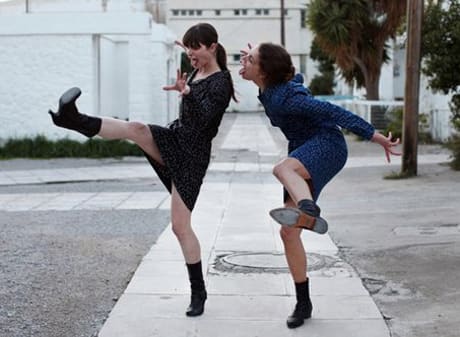Midway through Athina Rachel Tsangari's idiosyncratic sophomore outing, Attenberg, 23-year-old Marina (Ariane Labed) discusses the nature of Greek architecture with dying father Spyros (Vangelis Mourikis). Citing dissatisfaction with the bourgeois mentality, he – the architect of their surroundings – reflects on the peculiarity of a society designing buildings specifically for their eventual dilapidated aesthetic. He expresses his dissatisfaction with post-modern, traditionalist sensibilities in a country rebuilding after economic collapse, reflecting on a culture that skipped the industrial revolution only to wind up a mining site.
This socio-cultural context is equated with wildlife behaviour and environmental adaptability for modes of survival. When not watching David Attenborough's BBC wildlife docs, Marina observes promiscuous best friend Bella (Evangelina Randou) branching out into the world for sexual adventure and socialization, wondering if her lack of interest in such recreation means she might be different. She asks her father if he too has sexual desires (specifically for her), also commenting on her discomfort with the knowledge of his having genitals, discussing more candid specificities with Bella, such as seminal aroma and dreams of "prick-trees."
Her sheltered confusion and fear of personal difference on the subject lead to an awkward stab at a coital relationship with an engineer (Giorgos Lanthimos), which is heightened by the mirroring of sex with death when she has to arrange her father's cremation in Bulgaria. The result is a coming-of-age film that wisely reduces human histrionics to the mere propagation of a species within the confines of a geographic specificity and dominant cultural ideologue.
Tsangari handles the material without embellishment, observing Marina's goings-on with a non-judgmental, mostly stationary eye. It's a calculated choice, merely staging tableaux of unsettling character realities, interjecting repetitive actions via editing without a specific emotional gaze, which forces the audience to analyze the context of the actions rather than their traditional narrative trajectory.
If there is a flaw, it's that the overcrowding of thematic minutia leaves the third act cleaning up many tangents, with limited focus and engagement. It's only a minor problem, overall, barely harming a film that challenges the audience with some less than savoury realities, boldly representing a new wave of startling Greek cinema.
(Films We Like)This socio-cultural context is equated with wildlife behaviour and environmental adaptability for modes of survival. When not watching David Attenborough's BBC wildlife docs, Marina observes promiscuous best friend Bella (Evangelina Randou) branching out into the world for sexual adventure and socialization, wondering if her lack of interest in such recreation means she might be different. She asks her father if he too has sexual desires (specifically for her), also commenting on her discomfort with the knowledge of his having genitals, discussing more candid specificities with Bella, such as seminal aroma and dreams of "prick-trees."
Her sheltered confusion and fear of personal difference on the subject lead to an awkward stab at a coital relationship with an engineer (Giorgos Lanthimos), which is heightened by the mirroring of sex with death when she has to arrange her father's cremation in Bulgaria. The result is a coming-of-age film that wisely reduces human histrionics to the mere propagation of a species within the confines of a geographic specificity and dominant cultural ideologue.
Tsangari handles the material without embellishment, observing Marina's goings-on with a non-judgmental, mostly stationary eye. It's a calculated choice, merely staging tableaux of unsettling character realities, interjecting repetitive actions via editing without a specific emotional gaze, which forces the audience to analyze the context of the actions rather than their traditional narrative trajectory.
If there is a flaw, it's that the overcrowding of thematic minutia leaves the third act cleaning up many tangents, with limited focus and engagement. It's only a minor problem, overall, barely harming a film that challenges the audience with some less than savoury realities, boldly representing a new wave of startling Greek cinema.
